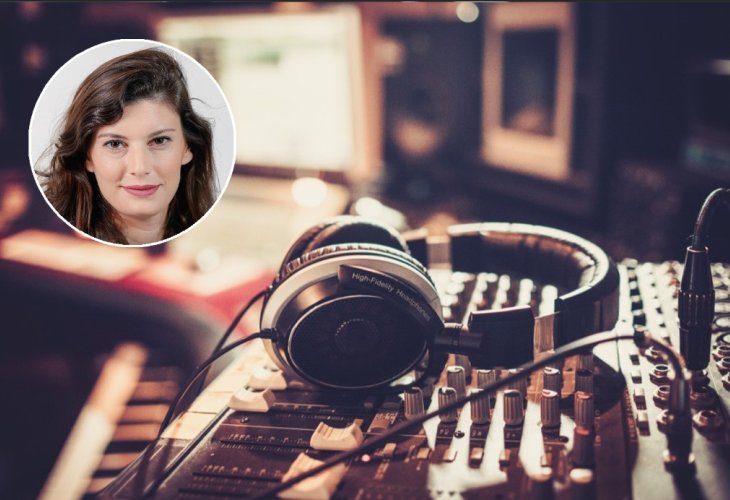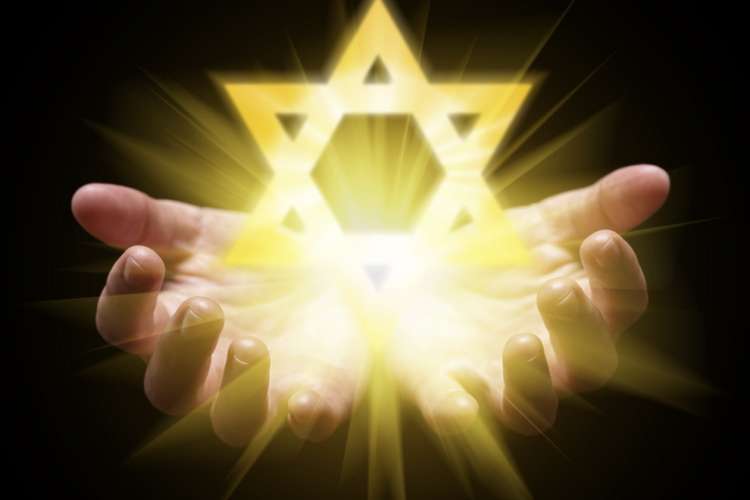Yaara Zarad: "We Were Misled for Years"
A deep sense of alienation, establishment in the world of media, and working for the Likud campaign. Yaara Zarad, journalist for Channel 20 and Galei Israel, shares in a first interview about her closeness to a life of Torah and mitzvot, and reveals the act by a scout leader that caused her to suddenly leave the movement.
 (Photo: shutterstock). In the circle: Yaara Zarad (Photo: Moshik Shama)
(Photo: shutterstock). In the circle: Yaara Zarad (Photo: Moshik Shama)"It happened when I was quite young, during Passover," recalls Yaara Zarad, 31, a media personality residing in Kfar Saba. "I attended a routine gathering at the scouts, as usual. At some point during the event, they served us food, and to my great surprise, they brought us pita bread. It was very strange to me, and when I tried to understand what was happening and how during Passover they served chametz, the leader tried to explain to me why keeping kosher wasn’t necessary. Having been born and raised in a traditional Mizrahi household, I felt this was unacceptable. Although my friends and acquaintances were very left-wing, I suppose the tradition seeped into me. I couldn’t continue like this, and two weeks later, I left the movement."
"I Always Felt Like the Odd One Out"
How did you cope with the significant gap between your upbringing and your environment?
"For many years, it was very difficult. Only in recent years have I started to come to terms with it somehow. As I mentioned, I grew up in a traditional Mizrahi home; my father immigrated from Morocco and my mother from Iraq, but my entire environment was very secular. Although I witnessed tradition at home, I didn’t know how to define what traditionalism was, because in the general discourse, I understood you could either be religious or secular. That’s what I knew. Because I grew up in such a secular environment, I always felt like the odd one out. For example, at home, we had Shabbat meals, and I wasn't allowed to go out with friends during the meal. None of my friends then understood that."
Furthermore, Zarad says, the political views she absorbed at home, which naturally influenced her, added certain challenges to her life. "The political and media aspect was very present in our home, from the right side of the map. Our house was one of those where news, political panels, etc., were more commonly watched. Even if you suffer from what you see, it's always there. Because of this, my whole life, I saw the imbalance and inherent injustice between the right and the left and the lack of representation of people like me, meaning, Mizrahi and traditional. Regarding Judaism, most of the time, almost always actually, the discourse in the media was against Judaism, and I remember really asking myself if my family was truly the 'odd one out.' I didn’t understand why our views weren’t represented, why I didn’t see people like us on the screen."
 (Photo: shutterstock)
(Photo: shutterstock)Moreover, her political views, she says, also interfered with her social relationships. "In high school, as a student with right-wing views, I quickly realized I was in the minority. 95% of my class were left-wing and secular. We had quite a few political discussions, and it felt unpleasant to be so different. And if that wasn’t enough, the Mizrahi aspect was also an issue. At home, for example, we listened to Mizrahi music, but I didn’t hear that music anywhere else, like at school, in the youth movement, or at friends' houses."
"At home, we talked about the history of the Mizrahim; my parents, for example, told of the time they lived in housing projects and transit camps, but at school, they never talked about it, only about the history of those from European countries. Because of all these things, I grew up in dissonance. I felt alienated and strange. Unfortunately, in the struggle between being religious and secular, which I didn’t really know how to navigate, in high school, I leaned more towards secularism. My friends were secular, the environment was secular, and combined with the desire for teenage rebellion, I went to the secular side. It was difficult for me with this middle ground, and I felt I had to make a clear choice."
Fighting for Home
After military service in a police framework, Zarad began studying for a bachelor's degree in communication, which she pursued at Ariel University, and afterwards joined the media world. She says she did this because of a burning desire to change things from within. "After finishing my studies, I worked for about five years in the digital field, and four years ago, I joined Galei Israel. I started as a producer and later as a program presenter. Alongside this, three years ago, I began appearing on Channel 20. Additionally, in the second round of elections in this cycle, held in September, I took a break from the media to serve as a spokesperson in the public relations campaign headquarters of the Likud campaign. It was a very interesting and challenging period."
"It is very important to me to be an active player in the media world, and this definitely includes the Twitter arena," Zarad says, "because I firmly believe that the voices of the right are not heard enough, and the voices of the religious and traditional are even less heard. This situation manages the discourse and the public consciousness, and today I understand that we have been misled for many years. They made us think about reality as others wanted us to think about it, not as it truly is. This went on for many years, and there were several negative peaks, like the Oslo Accords explosion and the disengagement, for example. The media soothed the people, said it would pass peacefully, and only afterwards did many understand someone took them for a ride."
Do you think there's a significant change in the situation today compared to 20 years ago?
"There is definitely improvement; the religious and right-wing are more heard and more represented, but we still have a long way to go. There is still much to be done. Even today, many influential media outlets aim to portray the right-wing and religious as stupid, as baboons, and we have to fight that. It is convenient for Israeli media to present things this way. Likudniks, Shasniks, etc., are presented as a strange tribe that doesn’t receive a genuine place in the discourse. They are presented many times as bizarre and belligerent, and no one truly tries to understand them, and worse - they are mocked. To tell the truth, this is the main struggle today in Israel, and it was essentially what the elections were about."
"There is a struggle between some of the secular public, a public which over time has become more and more anti-Jewish, and the traditional and religious public. You can see this in the discourse about religious coercion, tefillin stands, the war on events conducted separately, etc. The mere invention of the term 'religious coercion' and its insertion into public discourse shows that the ultra-secular current is gaining momentum."
"Conversely, for the traditionalists, of course, this is not the case. Even if they do not adhere to every detail in halakha - they love Judaism, the Land of Israel, and the family unit is also important to them. This is the real battle in Israel today - between those who love Judaism and want to maintain this country as both Jewish and democratic, and those who aspire for us to be a country like all others, a country of all its citizens. And in this struggle, with Hashem’s help, we will win."
 (Photo: shutterstock)
(Photo: shutterstock)
"I Have Always Believed"
Alongside Zarad's public struggles, she has experienced personal growth in observing the mitzvot, which she is willing to discuss willingly. "The process is very natural to me, and I’m doing it at a pace that suits me, according to what feels right. It’s very important to do these things at an appropriate pace. Moreover, my family also accepts it as something natural, because as I said, I come from a traditional home, and these shifts are quite natural for us. In my family, it wasn’t received with shock, but rather more like 'Ok, great.'"
"Regarding Shabbat observance, a few months ago, I just felt a desire to do it. It started as a desire to keep one Shabbat, and it was so good and pleasant for me that I decided to continue. It was very powerful for me. Since then, the Shabbatot I experience give me a sense of peace I hadn't known, for 25 hours. It’s really a detachment from all the routine, the chaos. Suddenly the thoughts also become more settled. In general, that hour when Shabbat comes in is the best hour of the week for me. I light candles, Shabbat enters, and everything calms down within me. I can really feel it physically. Of course, it also connects me to my roots. My grandparents on both sides were religious."
"In general, if during high school my interest was to escape from Judaism towards secularism, today the direction is much more to connect with my family’s tradition and the tradition of the Jewish people. Many times I think of my grandparents, who so dreamed of coming to the Land of Israel. Jerusalem was truly a dream for them. Today, as we are here, I believe this generation should do as much as possible to connect with its tradition, and know as much as possible about Judaism. In some sense, it’s the easiest and most comfortable to run away from it because it’s not always easy to fulfill mitzvot, but it’s very, very important."
"I have always believed in the Creator of the World; I always felt Him, and even on the long trips I took abroad I felt there was divine protection over me, that there was someone watching over me. Of course, I also want to preserve my family’s tradition, but the main thing in observing the mitzvot is keeping the overall tradition of Judaism and fulfilling the word of the Creator of the World, who bequeathed us this tradition."

